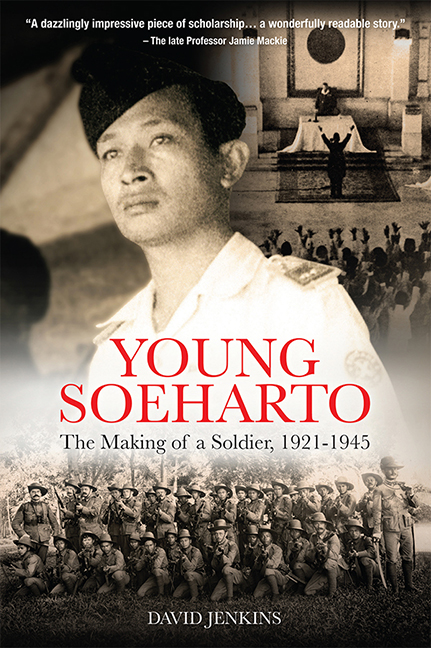Book contents
- Frontmatter
- Contents
- Foreword
- A Note on Spelling and Names
- A Note on Military Organization
- Maps
- List of Charts
- Preface
- Soeharto Family Tree
- 1 “The Sultan came to me and asked about that Family tree”
- 2 “The Cork on which the Netherlands Floats”
- 3 “They Regard Holland as a very Weak Power”
- 4 “An Invisible Motivating Force”
- 5 “What kind of Islam is this?”
- 6 “Soeharto is a Closed Book”
- 7 “I was Suited to the Disciplined life of the Military”
- 8 A Reassuringly Familiar World
- 9 A Policeman for the Japanese
- 10 An Armed Force Conjured out of Nothing
- 11 “The whole Island was Ablaze with Enthusiasm”
- 12 “Don’t make them too Strong!”
- 13 “Soeharto was a Cautious Man”
- 14 “Why did they Choose Soeharto?”
- Glossary and Abbreviations
- Notes
- Acknowledgements
- Bibliography
- Index
- About the Author
Foreword
Published online by Cambridge University Press: 09 October 2021
- Frontmatter
- Contents
- Foreword
- A Note on Spelling and Names
- A Note on Military Organization
- Maps
- List of Charts
- Preface
- Soeharto Family Tree
- 1 “The Sultan came to me and asked about that Family tree”
- 2 “The Cork on which the Netherlands Floats”
- 3 “They Regard Holland as a very Weak Power”
- 4 “An Invisible Motivating Force”
- 5 “What kind of Islam is this?”
- 6 “Soeharto is a Closed Book”
- 7 “I was Suited to the Disciplined life of the Military”
- 8 A Reassuringly Familiar World
- 9 A Policeman for the Japanese
- 10 An Armed Force Conjured out of Nothing
- 11 “The whole Island was Ablaze with Enthusiasm”
- 12 “Don’t make them too Strong!”
- 13 “Soeharto was a Cautious Man”
- 14 “Why did they Choose Soeharto?”
- Glossary and Abbreviations
- Notes
- Acknowledgements
- Bibliography
- Index
- About the Author
Summary
David Jenkins’ biography of the late dictator of Indonesia, General Suharto, is truly extraordinary. The only other grand biographies of famous Indonesians—Rudolf Mrázek's on the country's first Prime Minister, Sutan Sjahrir, and Harry Poeze's on the legendary communist Tan Malaka— were written long after their heroes were dead, and depended mainly on archival sources.
Jenkins became very well known for his book Suharto and His Generals, published in 1984 when the dictator was at the peak of his power. This work relied substantially on the author's astonishing store of intimate interviews with senior and high-ranking generals of Suharto's generation. The biography still relies on Jenkins’ unique access to the military elite right up to the present, which one can only explain by his calm, tact, patience, and friendly sobriety. But it also relies on Jenkins’ searches in all kinds of newly-opened archives, not only in Indonesia, but in the UK, Japan, the Netherlands, the US and Australia.
Rather than spending a lot of time and paper denouncing the brutal and secretive dictator of 30+ years (in the manner of most academic work on Suharto), Jenkins does a great job of locating him within the turbulent framework of Indonesia's society and politics from the last years of firm Dutch colonial rule, the violent Japanese Occupation, the revolutionary war 1945–49 which ended with worldwide recognition of the country's independence, the creation and downfall of constitutional democracy, the deepening of the Cold War, the overthrow of Sukarno's populistauthoritarian Guided Democracy, the vast massacres of the left in 1965–66, and Suharto's own coming to power.
The most fascinating part of the book is what Jenkins discovered about Suharto's parents, his childhood and (minimal) education, his training in the colonial military, his experiences in the Japanese-formed Peta military, and his activities during the Revolution. He had to ease his way through a vast amount of lies, propaganda, secretiveness, and prejudices. As a much-respected long-time journalist, Jenkins’ prose is excellent, without any academic gobbledygook, his analysis is almost always astute and balanced, and his attitude is based on the big questions of how and why a man like Suharto could not only come to power but could also maintain it so long.
- Type
- Chapter
- Information
- Young SoehartoThe Making of a Soldier, 1921–1945, pp. ix - xPublisher: ISEAS–Yusof Ishak InstitutePrint publication year: 2021



